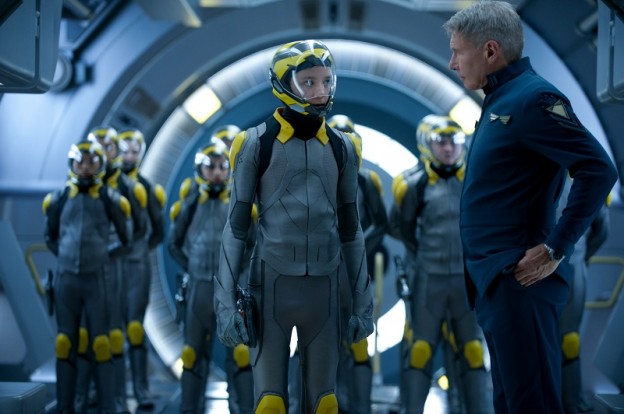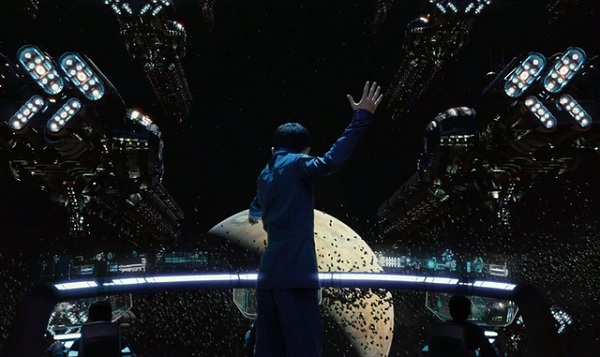Ender’s Game may be based on the influential 1985 science fiction novel by Orson Scott Card, but the film adaptation – finally coming to fruition nearly 30 years after its publication – sadly lacks the same kind of impact as the source material. But then again, let’s take this from the top.
The film – written and directed by Gavin Hood (X-Men Origins: Wolverine) – takes place in a future world where Earth’s military forces rely on exceptionally gifted children to protect them from the looming threat of the Formics, an insect-like alien race that once invaded the planet. Colonel Graff (Harrison Ford) and his team take particular interest in one young boy – conveniently named Ender (Asa Butterfield) – whom they believe can end (get it?) this ongoing conflict once and for all, becoming humanity’s greatest hero in the process. That basic premise begins with Ender’s recruitment by Graff and follows his ascent to command, all while Ender himself doubts his own ability to lead as well as the true intentions of his various authority figures.
At its most basic level, there’s not a whole lot of a difference between Ender’s Game and any other fantasy or sci-fi epic. Star Wars, The Matrix, The Lord of the Rings and Harry Potter all center on one unlikely hero who discovers his own destiny as a hero and protects the world around him from a malicious evil. Just like Ender, Luke, Neo, Frodo and Harry were all chosen by a wise older figure, and while much of this is owed to Joseph Campbell’s perennial writings on the hero’s journey and all the archetypes therein, the fact that Ender’s Game is only now making it to the big screen has the unfortunate effect of making it feel a bit derivative (a sort of Harry Potter meets Starship Troopers), even while its source material likely helped to inspire some of the box office titans that followed.
While Ender’s Game fails to deliver a truly unique story, it does manage to bring an incredibly strong cast together to bring this tale to life. However, Oscar nominees Abigail Breslin (Little Miss Sunshine) and Viola Davis (The Help) are criminally underused, and the brilliant Sir Ben Kingsley feels more wasted here than in his ultimately-disappointing turn as “the Mandarin” (fans know why that’s in quotes) in this year’s Iron Man 3.
Thankfully, the film wisely focuses much of its emotional tension on the tenuous protege/mentor relationship between Ender and Graff. Butterfield and/or Ford feature in nearly every scene, and their moments together deliver the most crackling of the film’s dramatic moments. Butterfield is particularly on his game here and proves that his charismatic leading role as the title character in Martin Scorsese’s Hugo was no fluke. At only 16 years old, the young actor has more charm and brings a more commanding on-screen presence than the majority of his older, more experienced counterparts.
Still, the film’s pacing and bland action setpieces feel exceedingly subpar to most of today’s blockbusters, especially coming so closely on the heels of Alfonso Cuaron’s ground-breaking work in Gravity. As a filmmaker, Hood is merely sufficient and doesn’t infuse much style or flair in the world of Ender’s Game, leaving the impression that the director is merely going through the motions of a sci-fi epic rather than pouring his heart and soul into bringing Ender’s world to vibrant life. In fact, only a few choice moments following Ender and his fellow recruits into “the Battle Room” offer any hint at the greatness that might have been translate from Card’s novel.
In short, Ender’s Game doesn’t establish itself as a worthy foundation for a franchise – though that is clearly the intent, as Card published a dozen novels following the character – but there are enough sharp story elements and promising characters here to give the series another shot at elevating the material and fleshing out what is merely glossed over in the finished film. A climactic plot twist – which essentially changes the stakes of the entire film – is glossed over far too quickly, and the credits roll before the impact of this reveal can even register with the audience, let alone the characters. If nothing else, a sequel would give Butterfield the opportunity to lead his own franchise and provide the creative team with the chance to get it right.



I agree with this review 100 percent. Although I have not yet read the series, this film would have affected me in a different way if it came out soon after the book did. It goes to show that newer books that are more based out of fiction (I.e Gone Girl) can come out in theaters much faster than futuristic and fantasy like films.
All the elements have to be right in order for it to truly work. “Ender’s Game” biggest lacking element is timing.